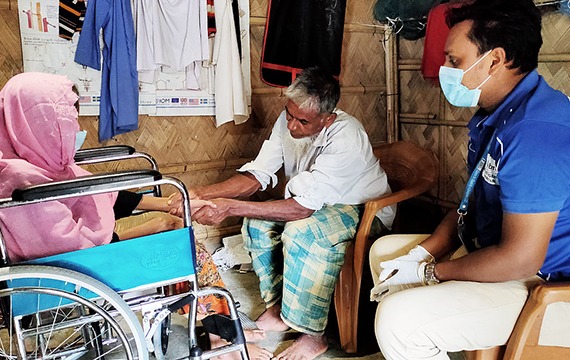World Humanitarian Day

Our partners and staff in the refugee camps of Cox’s Bazaar, Bangladesh, show selfless commitment during the COVID-19 pandemic by ensuring that persons with disabilities continue receiving inclusive humanitarian services.
Every 19 August, we celebrate World Humanitarian Day to honour humanitarian efforts made around the globe and to assert the need for supporting people in crisis. This year, we celebrate our staff at our local partner Centre for Disability in Development (CDD) in Bangladesh.
Our work in the refugee camps of Cox’s Bazaar
cbm along with CDD has been working in refugee camps and host communities in the district of Cox’s Bazar in south Bangladesh since November 2017.
Since the beginning, cbm and CDD have been providing healthcare, mental health, psychosocial and rehabilitation support, especially for marginalized persons and those with disabilities. Furthermore, we liaise with international organisations such as UNICEF, Care, Oxfam etc. to mainstream inclusive education, child protection and disability inclusion within the refugee camps.
A day in the life of Ariful Arman
24-year-old Ariful is an occupational therapist working with CDD in the refugee camps of Cox’s Bazaar. The homes he visits everyday are very cramped – there’s hardly any space to do rehabilitation exercises with his patients.
Ariful puts in long hours every day, travelling in the huge refugee camps to visit as many patients as possible. Even before the COVID-19 pandemic, the refugees in the camps lacked clean drinking water, latrines and washing facilities. Since the pandemic broke out, their plight has intensified. Ariful Arman’s working conditions also leave a lot to be desired: “Sometimes it is a challenge for me to carry out therapy with my patients and at the same time keep a distance because too many people live in these narrow huts,” says the young man. Almost all of his patients have disabilities and many of them are unable to leave their accommodation. Ariful is their connection to the world. He ensures that they not only receive the necessary therapy, but also suitable devices such as a wheelchair or walking aids. This is the only way they can reach the food distribution centres or the sanitary facilities in the camps.
Interview with Ariful Arman
This photo shows a therapist wearing a mask talking with someone in a wheelchair inside a hut.
Occupational therapist Ariful (pictured wearing a blue shirt) on his daily rounds visiting people with disabilities in the refugee camps in Cox’s Bazaar, Bangladesh.
What are the challenges faced by people with disabilities here in the current crisis?
Sometimes it’s a challenge to conduct therapy with my patients while keeping distance because too many people live in small cramped huts. Due to the lockdown, less services were available, and we were only able to work shorter periods per day. In addition, the situation in the camp is also very troubling for me psychologically. I feel depressed and anxious because I haven’t been able to meet with my family for many months now.
What has changed in your project and in your life since the beginning of the crisis?
Some strategies have changed: Now I am raising awareness of COVID 19 in every therapy session so that my patients can protect themselves from the pandemic. In my personal life, activities such as visiting friends or my home have been restricted.
How do you reach and address the needs of people with disabilities here at camp?
During strict lockdown, we were able to provide support through tele-rehabilitation. So we were able to continue our work during the difficult time. Now I have started door-to-door visits again with my patients to carry out on-site therapy, while adhering to proper safety and hygiene rules.
How do you personally deal with the workload in the stressful pandemic situation? What is your motivation?
I think I am really lucky to be able to work with people with disabilities. I am a humanitarian worker and it motivates me very much that I can help people with disabilities – because I see how they benefit from my work.
Disability in Emergency Situations
The World Health Organization estimates that 15 percent of the global population live with disability. In any emergency or disaster, people who live with some form of disability are disproportionally affected. Reasons for this include inaccessibility of warning messages and emergency shelters, loss and damage of assistive devices, disruption of support networks and increased difficulty in accessing basic humanitarian operations (food, water, shelter, sanitation and health care services). At the same time, emergencies can increase the number of people who experience disability, both short and long-term, due to injuries sustained and lack of effective medical services.
That’s why cbm aims to ensure all planning for and responses to emergency situations are inclusive of persons with disabilities and more at-risk persons and their families.